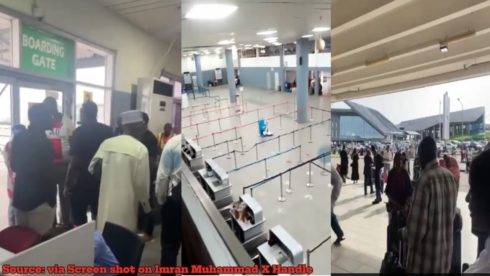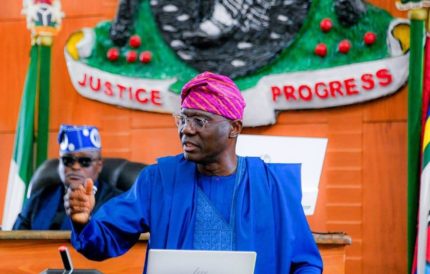The indefinite strike initiated by the Nigeria Labour Congress (NLC) has resulted in the cancellation of flights at Abuja Airport, leaving numerous passengers stranded. The strike, which commenced on June 3, 2024, has led to the shutdown of airport operations, impacting both domestic and international flights. Passengers are advised to contact their airlines for updates on their travel plans, as the situation continues to unfold.
The cancellation of flights has caused significant frustration and inconvenience to travelers, with many expressing their disappointment and anger on social media. The airport authorities have apologized for the disruption and are working diligently to resolve the issue as soon as possible. The NLC strike has also had a ripple effect on other sectors, including transportation and healthcare, with many workers joining the protest. The situation remains fluid, and passengers are urged to stay informed and plan accordingly.
NLC Strike Causes Travel Disruptions
The NLC strike has wreaked havoc on travel plans, leaving countless passengers stranded at the airport. The strike’s impact on airline operations has resulted in numerous flight cancellations and delays, causing frustration and inconvenience for travelers. To mitigate the disruption, travelers are advised to regularly check with their airlines for updates on their flights and to plan accordingly.
The strike’s far-reaching impact extends beyond the travel sector, with the economy feeling the effects of the disruption in transportation and other services. Many businesses have been affected, and the government has appealed to the NLC to call off the strike. However, the labor union remains resolute, insisting that its demands must be met before it can consider ending the strike. As the situation continues to unfold, travelers and businesses alike are feeling the strain of the strike’s economic impact.
Passengers Stranded at Abuja Airport
The cancellation of flights at Abuja Airport has left numerous passengers stranded, causing frustration, disappointment, and anger among travelers. The airport authorities have responded by setting up a help desk to provide passengers with essential information and assistance. The stranded passengers include business travelers, students, and individuals with critical appointments, underscoring the significant impact of the strike on their lives.
The strike’s effects have also been felt by the airport’s food and beverage businesses, with vendors reporting a significant decline in sales. The situation highlights the far-reaching consequences of the strike, affecting not only passengers but also airport businesses and the local economy. As the strike continues, passengers and businesses alike are feeling the strain, emphasizing the need for a swift resolution to the dispute.
NLC Demands Pay Increase
The Nigeria Labour Congress (NLC) is urging for a pay increase for workers, citing the high cost of living and inflation as key drivers behind its demand. In addition to a salary hike, the labor union is also pushing for better working conditions and benefits for workers. The NLC’s demands come as workers struggle to make ends meet amidst rising living costs and stagnant wages.
The government’s offer of a 10% pay increase has fallen short of the NLC’s expectations, leading to the labor union’s rejection of the proposal. The strike has garnered support from other labor unions, with many workers joining the protest to demand fair compensation and better working conditions. Despite the government’s appeal to call off the strike, the NLC remains resolute in its demands, insisting that its demands must be met before it can consider ending the strike. The stalemate continues, with workers and the government at an impasse.
Government Appeals to NLC
The government has made a passionate appeal to the Nigeria Labour Congress (NLC) to call off the strike, citing the devastating impact it has had on the economy and the suffering it has inflicted on citizens. The government has offered to engage in negotiations with the NLC, but the labor union remains steadfast in its demands, refusing to budge until its demands are met. The strike has paralyzed key sectors of the economy, including healthcare and transportation, leaving many stranded and struggling to access essential services.
As the strike continues to bite, the government has deployed security personnel to the airport to maintain order and ensure the safety of passengers. The move is aimed at preventing chaos and ensuring that travelers are protected from harm. Despite the government’s efforts to find a resolution, the strike shows no signs of abating, with the NLC insisting that its demands must be met before it can consider ending the strike. The standoff continues, with the economy and citizens bearing the brunt of the strike’s impact.
Negotiations Ongoing with NLC
Negotiations between the government and the Nigeria Labour Congress (NLC) are ongoing, with both sides engaged in intense talks to reach a compromise. The government has proposed an increase in the minimum wage, but the NLC has rejected the offer, deeming it insufficient to address the plight of workers. The strike has entered its third day, with no end in sight, and the standoff continues to disrupt the economy and daily life.
The strike has garnered international attention, with many countries issuing travel advisories to their citizens, warning them to avoid traveling to Nigeria until the strike is resolved. The strike’s impact on the country’s reputation has also been significant, with investors expressing concern about the stability of the economy. As the strike continues, the government and the NLC must find a resolution to address the demands of workers and restore normalcy to the economy. The world watches as Nigeria navigates this critical moment in its labor history.
Table of Contents
Discover more from OGM News NG
Subscribe to get the latest posts sent to your email.













